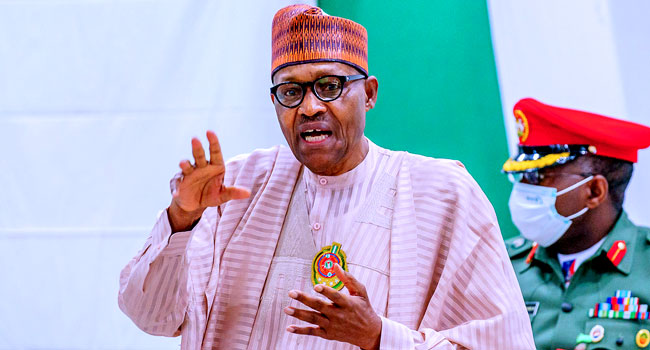Inflation Rate Hits 20.5% As Nigerians Bites Their Fingers In Pain

President Muhammadu Buhari
The Inflation in Nigeria has risen by 0.92% basis points to 20.52% in August from 19.6% in July as Nigerians continue paying costly for goods and services.
The above was contained in a report released by the National Bureau of Statistics yesterday.
The Consumer Price Index (CPI) report by the NBS showed that Nigeria’s CPI rose by 1.77 per cent on a month-on-month basis, compared to the 1.82 percent increase recorded in the previous month.
The report added that food inflation rose to 23.12 percent in August 2022 on a year-on-year basis, representing a 2.82 percent increase when compared to 20.30 percent in August 2021.
“This rise was caused by an increase in prices of bread and cereals, food products like potatoes, yam and other tubers, fish, meat, oil and fat,” the report said.
Although inflation concerns are not peculiar to Nigeria, the circumstances driving the surge are peculiar, especially, in the form of poor earnings from natural resources, as a result of theft, sabotage, insecurity, and banditry, which have affected local production; foreign exchange concerns, huge expenditure, and debt burden, among other challenges.
The new inflation rate raises concerns for Nigeria, placing pressure on the apex bank to increase interest rates, in desperate attempts to rein in rising prices.
Already, Moody’s new report says African banks will respond to the rising inflation and associated higher savings rates with an upward re-pricing of loans.
The response, the report foresees, would weaken borrowers’ capacity to repay existing loans and increase banks’ provisioning for loan loss. It, however, notes that most of the banks “took proactive provisions following the outbreak of the pandemic,” which will limit the extra provisioning required as defaults rise.
“The impact on Nigerian and Kenyan banks’ margins will be muted because their interest rates are already high and some of their deposit rates are index-linked to the policy rate. African banks’ sizeable holdings of government debt securities will fall in value as interest rates rise, but these unrealised losses are unlikely to crystallise,” the Moody’s Corporation’s arm states.
Read Also: NIDCOM: Many Stranded Nigerians in UAE are Freed Criminals
In Nigeria, specifically, the report notes that large volumes of the loans are short-term; hence, they will be re-priced higher. This, it adds, could be constrained by already higher lending rates and stiff competition.
Speaking to Guardian, Prof. Uche Uwaleke said the 20.52 per cent year-on-year inflation increase was expected, adding that steps taken by the Central Bank of Nigeria (CBN) on monetary policy tightening stance alone may not assuage the situation.
Uwaleke, who is a professor of Economics at the Nasarawa State University. Keffi, Nasarawa State, said the increase in headline inflation above the psychological threshold of 20 per cent did not come as a surprise in view of the rising inflation trend in many economies, partly caused by the Russian-Ukrainian conflict.
He said it is interesting to note that the NBS, in its latest CPI report, provided a clue as to the major factors driving the inflationary pressure in Nigeria, namely supply disruptions and rising cost of production.

